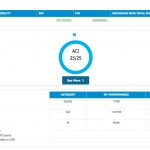Such minutia makes my head spin. However, the good news is that RISE users report high satisfaction with setting up and using the registry in their practices. Significantly, these increased requirements for 2018 will not be onerous to RISE users because the RISE registry reports on 100% of all patients in the Quality category regardless of payer status.
Submitting for 2018
Given the increasing requirements of MIPS, it is important that you have a plan in place for how you will report data for 2018. I encourage you to look into joining the RISE registry and use it as your reporting option. You can register now. If you are already a RISE user and would like to check your status for 2018 or would like to discuss your reporting strategy, you can speak directly with ACR registry staff by emailing [email protected]. ACR registry staff also offers RISE users different avenues and media for support and education so you can stay up to date on how rheumatology providers can best demonstrate their quality care for reimbursement.
I enthusiastically recommend that all ACR/ARHP members take advantage of this member benefit and explore how using RISE can lead to success in the new payment system. This is another example of how, in the ever-changing landscape of policy affecting rheumatology professionals, the ACR is there for you, so you can be there for your patients.
 David I. Daikh, MD, PhD, is the 81st president of the ACR. Dr. Daikh serves as the director of the Rheumatology Fellowship Training Program at the University of California, San Francisco and as chief of the Rheumatology Division at the SFVA Medical Center, where he directs the Rheumatology Clinic.
David I. Daikh, MD, PhD, is the 81st president of the ACR. Dr. Daikh serves as the director of the Rheumatology Fellowship Training Program at the University of California, San Francisco and as chief of the Rheumatology Division at the SFVA Medical Center, where he directs the Rheumatology Clinic.
References
- Medicare Program; Merit-Based Incentive Payment System (MIPS) and Alternative Payment Model (APM) Incentive Under the Physician Fee Schedule, and Criteria for Physician-Focused Payment Models: Table 58 of the 2017 MACRA Final Rule. Federal Register. 2016 Nov 4.
- Quality Payment Program Year 2: Final Rule Overview. (n.d.).

